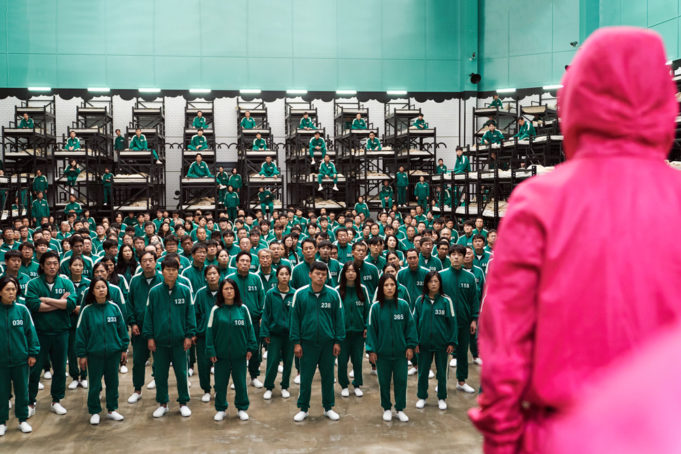Netflix surely didn’t anticipate Squid Game becoming its biggest hit ever as an original series, as the Korean series hit the streaming service last month with a minimum of fanfare. The word-of-mouth in the West proved so strong that Netflix is now selling merchandise for this dystopian thriller where hundreds of characters are killed in graphic and brutal fashion. If that doesn’t sound like your cup of soju, you should know that this show has more than violence on its mind.
The story begins with Seong Gi-hun (Lee Jung-jae), a 47-year-old spottily employed loser with a gambling problem and a 10-year-old daughter (Cho Ah-in) whom he’s about to lose because his ex-wife is moving her to America. Deep in debt, he leaps at the chance to participate in a mysterious game for a cash prize of 45.6 billion won, more than $38 million at current exchange rates. He’s picked up in a car and anesthetized, waking up in a bunker as Player 456 of 456 adult competitors. They’re instructed to play the kids’ game Red Light, Green Light, and when players are caught moving after the red light, they’re shot dead by sniper rifles. Gi-hun and the others must survive that game and five more to claim a cut of the prize.
You may be reminded of The Hunger Games, but there are other precedents for this show. The Brazilian dystopian science-fiction series 3% pitted 20-year-olds against one another for a chance to live in a crime-free utopia where all their needs would be taken care of, and the Chinese film Animal World placed 102 debt-ridden men in a giant rock-paper-scissors tournament with lethal consequences. The popularity of these entertainments, as other writers have pointed out, is evidence that capitalism in these countries and ours doesn’t work anymore. Workers aren’t paid a fair wage for a day’s labor while riches accrue to a few people who either already have money or enjoy an unthinkable run of luck.
The desperation of the various players that drives them to participate is well-evoked, whether it’s Player 199 (Anupam Tripathi), a Pakistani who assaulted the greedy boss who owed him six months’ back wages; Player 240 (Lee Yoo-mi), a young ex-convict who murdered her pedophile father; or Player 067 (Jung Ho-yeon), a North Korean refugee who still has family on the other side. What could be more pathetic than the early scene of Gi-hun weeping and cursing on his knees in a video arcade, needing a birthday present for his daughter and failing to win one in a crane game?
Where Squid Game distinguishes itself is in production values. The squalor on the streets of Seoul contrasts with the clean, unreal environments that the players find themselves in. The halls leading from the bunker to the gaming halls are made of plastic that’s so brightly colored that they seem like they were made from Lego bricks. The game is administered by masked guys in red robes, while the players wear green tracksuits with their own personalized numbers on them. This is unprecedentedly ambitious for a Korean TV show, most of which are either romantic comedies and dramas with modest budgets or historical epics set in feudal times. The unconventional score by Jung Jae-il (who wrote the music for the similarly class-conscious Parasite) builds tension effectively as well as further setting it apart from other TV.
The game and all its deaths are supposed to be taking place beneath everyone’s notice, but I like how the game is facing threats from all sides: Player 101 (Heo Sung-tae), a gang boss, plans to have his guys rob the place, an undercover cop (Wi Ha-joon) whose brother went missing infiltrates the game, and a ring of crooked administrators secretly feeds information and extra food to Player 111 (Yoo Sung-joo) in exchange for his help selling off the dead players’ organs. I’m not sure where the story goes after its first season — indeed, creator Hwang Dong-hyuk admitted he hadn’t planned on a second one. I worry that the show might go the way of other TV programs built on conspiracies, leading us up dead ends and introducing complications for their own sake. (I’m also not pleased with the sloppy English translation in the subtitles.) Still, what’s true of this first season will probably remain so: As long as Squid Game focuses on how society’s haves exploit its have-nots, it’s on solid ground.












